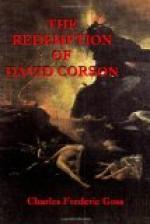“God and His angels,” said the young mystic softly, falling again into the mood from which he had been so rudely awakened.
“Angels!” scoffed the young materialist. “If thee was thinking of any angel at all, I will bet thee it was Dorothy Fraser.”
“Tush, child, do not be silly,” replied the convicted culprit. For it was easier than he would care to admit to mingle visions of beauty with those of holiness.
“I am not silly. Thee would not dare say thee was not thinking of her. She thinks of thee.”
“How does thee know?”
“Because she gives me bread and jam if I so much as mention thy name.”
This did not offend the young plowman, to judge by the expression of his face; but he said nothing, and, stooping down, loosened the chains of the whiffletree and turned the faces of the tired horses homeward. The cavalcade moved on in silence for a few moments, but nothing can repress the chatter of a boy, and presently he began again.
“Uncle Dave, was it really up this very valley that Mad Anthony Wayne marched with his brave soldiers?”
“This very valley.”
“I wish I could have been with him.”
“It is an evil wish. Thee is a child of peace. Thy father and thy father’s fathers have denied the right of men to war. Thee ought to be like them, and love the things that make for peace.”
“Well, if I can not wish for war, I will wish that a runaway slave would dash up this valley with a pack of bloodhounds at his heels. Oh, Uncle Dave, tell me that story about thy hiding a negro in the haystack, and choking the bloodhounds with thine own hands.”
“I have told thee a hundred times.”
“But I want to hear it again.”
“Use thy memory and thy imagination.”
“Oh, no, please tell me. I like to hear some one tell something.”
“Thee does? Then listen to the whip-poor-will, the cricket or the brook.”
“I hear them, but I do not know what they say. Tell me.”
“Tell thee! No one can tell thee, child, if thee can not understand for thyself. The message differs for the hearers, and the difference is in the ear and not the sound.”
They both paused for a moment, and listened to those soothing lullabies with which nature sings the world to sleep. So powerful was the tide that floated the mystic out on the ocean of dreams, he would have drifted away again if the child had not suddenly recalled him.
“I can not make out what they say,” he cried, “and anyhow there is no time to try. Come, let us go. Everybody is waiting for us.”
“Thee is right,” answered his uncle. “Go and let down the bars and we will hurry home.”
The child, bounding forward, did as he was told, and the tired procession entered the barnyard. The plowman fed his horses, and stopped to listen for a moment to their deep-drawn sighs of contentment, and to the musical grinding of the oats in their teeth. His imaginative mind read his own thoughts into everything, and he believed that he could distinguish in these inarticulate sounds the words, “Good-night. Good-night.”




